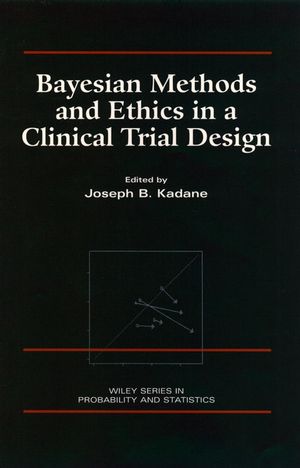Bayesian Methods and Ethics in a Clinical Trial DesignISBN: 978-0-471-84680-2
Hardcover
344 pages
January 1996
 This is a Print-on-Demand title. It will be printed specifically to fill your order. Please allow an additional 10-15 days delivery time. The book is not returnable.
|
||||||
How to conduct clinical trials in an ethical and scientificallyresponsible manner
This book presents a methodology for clinical trials that producesimproved health outcomes for patients while obtaining sound andunambiguous scientific data. It centers around a real-world testcase--involving a treatment for hypertension after open heartsurgery--and explains how to use Bayesian methods to accommodateboth ethical and scientific imperatives.
The book grew out of the direct involvement in the project by adiverse group of experts in medicine, statistics, philosophy, andthe law. Not only do they contribute essays on the scientific,technological, legal, and ethical aspects of clinical trials, butthey also critique and debate each other's opinions, creating aninteresting, personalized text.
Bayesian Methods and Ethics in a Clinical Trial Design
* Answers commonly raised questions about Bayesian methods
* Describes the advantages and disadvantages of this methodcompared with other methods
* Applies current ethical theory to a particular class of designfor clinical trials
* Discusses issues of informed consent and how to serve a patient'sbest interest while still obtaining uncontaminated scientific data
* Shows how to use Bayesian probabilistic methods to createcomputer models from elicited prior opinions of medical experts onthe best treatment for a type of patient
* Contains several chapters on the process, results, andcomputational aspects of the test case in question
* Explores American law and the legal ramifications of using humansubjects
For statisticians and biostatisticians, and for anyone involvedwith medicine and public health, this book provides both apractical guide and a unique perspective on the connection betweentechnological developments, human factors, and some of the largerethical issues of our times.
This book presents a methodology for clinical trials that producesimproved health outcomes for patients while obtaining sound andunambiguous scientific data. It centers around a real-world testcase--involving a treatment for hypertension after open heartsurgery--and explains how to use Bayesian methods to accommodateboth ethical and scientific imperatives.
The book grew out of the direct involvement in the project by adiverse group of experts in medicine, statistics, philosophy, andthe law. Not only do they contribute essays on the scientific,technological, legal, and ethical aspects of clinical trials, butthey also critique and debate each other's opinions, creating aninteresting, personalized text.
Bayesian Methods and Ethics in a Clinical Trial Design
* Answers commonly raised questions about Bayesian methods
* Describes the advantages and disadvantages of this methodcompared with other methods
* Applies current ethical theory to a particular class of designfor clinical trials
* Discusses issues of informed consent and how to serve a patient'sbest interest while still obtaining uncontaminated scientific data
* Shows how to use Bayesian probabilistic methods to createcomputer models from elicited prior opinions of medical experts onthe best treatment for a type of patient
* Contains several chapters on the process, results, andcomputational aspects of the test case in question
* Explores American law and the legal ramifications of using humansubjects
For statisticians and biostatisticians, and for anyone involvedwith medicine and public health, this book provides both apractical guide and a unique perspective on the connection betweentechnological developments, human factors, and some of the largerethical issues of our times.



